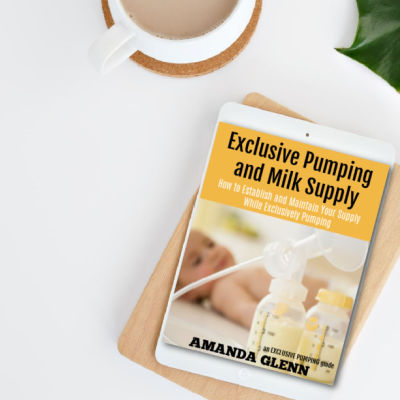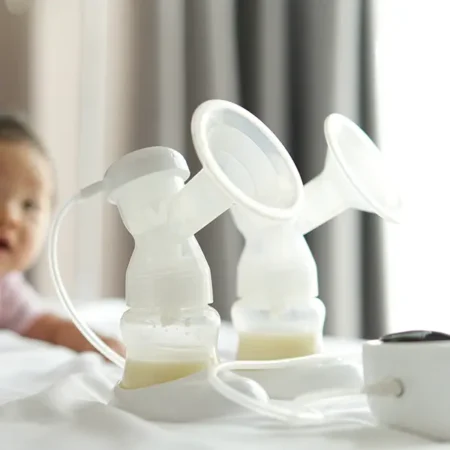The majority of people who exclusively pump struggled with nursing their babies before transitioning to exclusive pumping. Often, these new parents worked with a lactation consultant shortly after their baby’s birth to try to get their baby to latch or to troubleshoot weight gain issues in their infant.

This post may contain affiliate links, which means that if you click through and make a purchase, I’ll be compensated at no additional cost to you. I only recommend products I love! More info here.
Because most breastfeeding moms nurse rather than exclusively pump, lactation consultants may not be as familiar with it as an option and how they can best support parents who decide to do it.
(I’ve been through lactation counselor training myself and pumping was barely mentioned, let alone exclusively pumping, so it may be that training in this area is lacking.)
I asked readers about their experiences, and what they wish that their lactation consultants had known about exclusively pumping. Below is what they said.
1. Exclusively pumping long term IS possible.
My experience – and that of many of the exclusive pumpers who responded – was that the lactation consultants that we spoke to were dubious that pumping exclusively would work for very long.
Often, the message was that the pump is not as effective as a baby in removing milk, and that it was inevitable that our milk would “dry up” if we didn’t nurse.
It is true that some people don’t respond well to the pump and do struggle with producing enough milk when they are using one, but this isn’t the case for everyone.
Some of us are even able to pump much more than our babies could eat! In my case, my supply was actually greater at around 50 ounces per day for the baby I exclusively pumped for than for the two babies that I nursed. (I’d estimate it was closer to 30-35 ounces.)
There are thousands of people who have exclusively pumped for six months to a year, myself included. Exclusively pumping long term is absolutely possible and is a viable option for parents who for whatever reason are not able to (or do not want to) nurse.
When working with a new parent who is really struggling with nursing and ready to give up, it would be beneficial for a lactation consultant to support exclusive pumping as an option rather than to continue to encourage them to try to nurse, if that is what she wants.
Livie Larson, a former exclusive pumper, said, “We need to know that it’s possible, and to hear success stories of those who’ve done it for however long that they could.”
2. People who are considering exclusively pumping need information, help, and support specific to their situation.
Exclusive pumpers need different information and support than nursing mothers. In particular, some things that would be helpful include:
- Help finding the right size breast shield. Many women use the wrong size – especially if the size they need didn’t come with the pump – and they don’t know how to determine what size they should be using. Written descriptions and pictures can be difficult to decipher. A lactation consultant can be really invaluable in watching new parents pump and determining what size flange they need.
- Information about storing and using expressed milk, including how long milk can be refrigerated or frozen, and whether bottles that weren’t finished can be offered at the next feeding.
- Information about how the pump works and about pump parts and how to clean them.
- Information about how often and for how long to pump when exclusively pumping. A good guideline to start is to pump as many times a day as the baby is taking a bottle, with the total amount of pumping time per day being about two hours.
- Help connecting new exclusively pumping parents with veteran exclusive pumpers.
3. Rules about pumping for nursing mothers don’t always apply to exclusively pumping mothers.
Some guidelines about pumping that make sense for nursing parents don’t work as well for exclusive pumpers. For example, quite a few exclusive pumpers reported that they had been told to limit the amount of time that they spent pumping to 10 to 15 minutes.
Indeed, in many cases, it’s better for nursing mothers to not pump for excessive periods of time, because it can lead to oversupply, foremilk/hindmilk imbalance, and forceful ejection.
However, this particular rule about the length of pumping sessions doesn’t apply to exclusive pumpers, as none of these things cause adverse issues for them or their babies.
For example, forceful ejection is not an issue for your breast pump, and any foremilk/hindmilk imbalance issues can mitigated by the pitcher method.
Exclusively pumping parents may need to pump for longer periods of time in order to build their supply – for some people, sessions that are less frequent but longer can work better. Suggesting a strict 10-15 minute limit is not beneficial to people who aren’t nursing.
Additionally, it is common advice to put a newborn to the breast every two hours when babies are very young; some exclusive pumpers reported being told to “just pump every two hours” to mimic this feeding schedule. However, pumping every two hours is much more difficult than nursing every two hours, especially through the night, especially given that the parent may also have to care for baby at the same time.
Instead, it may be helpful to suggest pumping every 3-4 hours at night for slightly longer periods of time, and every 2-3 hours during the day, if possible. Here are some sample pumping schedules.
Additionally, lactation consultants could also provide guidance on how to get pumping sessions in while caring for a baby. For example, using a hands-free bra to pump can enable you to hold the baby or feed the baby while pumping; putting a bouncy seat on the floor next to you while you pump is another good option.
Need help with exclusive pumping? Use EPUMP30 for 30% off
4. Remember that exclusive pumpers are trying as hard as they can.
Many exclusive pumpers said that they felt as if their lactation consultants thought that they were “giving up” by choosing to exclusively pump.
One exclusive pumper, Tracy Turtel, said that lactation consultants should “understand that not being able to breastfeed is a huge disappointment and loss to many of us. Treating us like we’re failures does not help, nor does pushing us to do something we know isn’t right for us.”
Exclusive pumping is more work than nursing is. Like a nursing mom, an exclusive pumper needs to be concerned with milk supply and how often she needs to pump, as well as her breast health and issues such as engorgement, clogged ducts and mastitis. At the same time, like a formula feeding parent, she is constantly preparing and washing bottles.
“There is so much extra work – washing the bottles and pump parts, storing the milk, and pumping every 3 hours on a different schedule than the baby. It’s as if I have twins! One that needs a milk input and one that needs a milk output,” said Jodi Rowland, another exclusively pumping mom.
Because it is so hard, few people choose to do it over nursing, and most feel that for them it is a choice between exclusively pumping and formula feeding.
Helping people who want to nurse so that they can avoid all of this extra effort is wonderful; however, once a parent has decided to exclusively pump, supporting her and recognizing how hard she is working is invaluable.
In summary, lactation consultants that recognize that exclusively pumping is a viable option, support them in their decision, and provide them with the information that they need will be instrumental in helping these parents meet their (new) breastfeeding goals.

References
- Medela. “Medela Breast Shield Sizing Guide.” https://blog.medelabreastfeedingus.com/2015/05/medela-breastshield-sizing-guide/#.VvqQJZMrJE4














